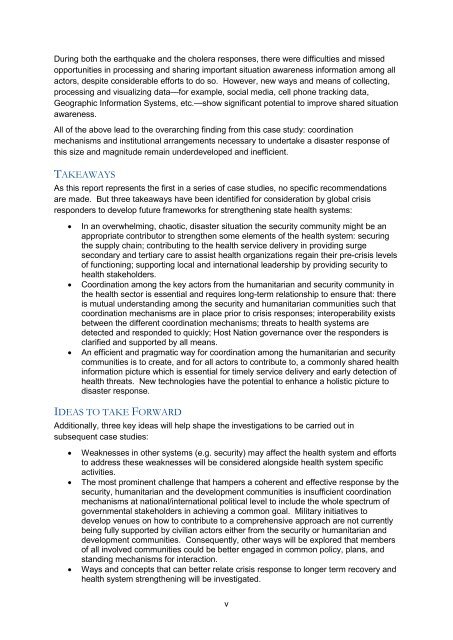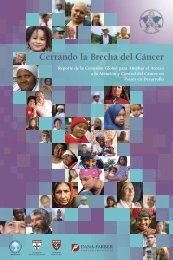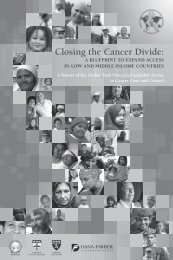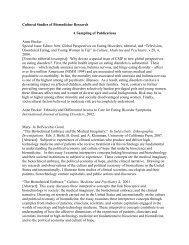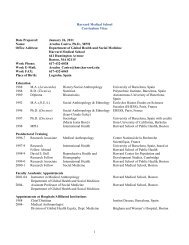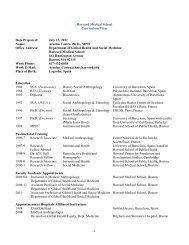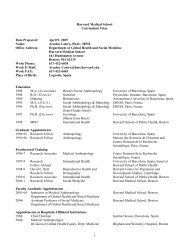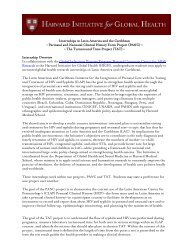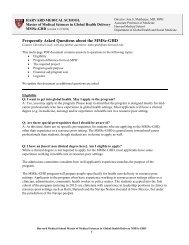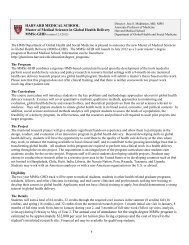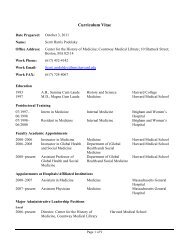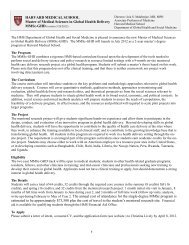Haiti Case Study - The Department of Global Health and Social ...
Haiti Case Study - The Department of Global Health and Social ...
Haiti Case Study - The Department of Global Health and Social ...
Create successful ePaper yourself
Turn your PDF publications into a flip-book with our unique Google optimized e-Paper software.
During both the earthquake <strong>and</strong> the cholera responses, there were difficulties <strong>and</strong> missed<br />
opportunities in processing <strong>and</strong> sharing important situation awareness information among all<br />
actors, despite considerable efforts to do so. However, new ways <strong>and</strong> means <strong>of</strong> collecting,<br />
processing <strong>and</strong> visualizing data—for example, social media, cell phone tracking data,<br />
Geographic Information Systems, etc.—show significant potential to improve shared situation<br />
awareness.<br />
All <strong>of</strong> the above lead to the overarching finding from this case study: coordination<br />
mechanisms <strong>and</strong> institutional arrangements necessary to undertake a disaster response <strong>of</strong><br />
this size <strong>and</strong> magnitude remain underdeveloped <strong>and</strong> inefficient.<br />
TAKEAWAYS<br />
As this report represents the first in a series <strong>of</strong> case studies, no specific recommendations<br />
are made. But three takeaways have been identified for consideration by global crisis<br />
responders to develop future frameworks for strengthening state health systems:<br />
• In an overwhelming, chaotic, disaster situation the security community might be an<br />
appropriate contributor to strengthen some elements <strong>of</strong> the health system: securing<br />
the supply chain; contributing to the health service delivery in providing surge<br />
secondary <strong>and</strong> tertiary care to assist health organizations regain their pre-crisis levels<br />
<strong>of</strong> functioning; supporting local <strong>and</strong> international leadership by providing security to<br />
health stakeholders.<br />
• Coordination among the key actors from the humanitarian <strong>and</strong> security community in<br />
the health sector is essential <strong>and</strong> requires long-term relationship to ensure that: there<br />
is mutual underst<strong>and</strong>ing among the security <strong>and</strong> humanitarian communities such that<br />
coordination mechanisms are in place prior to crisis responses; interoperability exists<br />
between the different coordination mechanisms; threats to health systems are<br />
detected <strong>and</strong> responded to quickly; Host Nation governance over the responders is<br />
clarified <strong>and</strong> supported by all means.<br />
• An efficient <strong>and</strong> pragmatic way for coordination among the humanitarian <strong>and</strong> security<br />
communities is to create, <strong>and</strong> for all actors to contribute to, a commonly shared health<br />
information picture which is essential for timely service delivery <strong>and</strong> early detection <strong>of</strong><br />
health threats. New technologies have the potential to enhance a holistic picture to<br />
disaster response.<br />
IDEAS TO TAKE FORWARD<br />
Additionally, three key ideas will help shape the investigations to be carried out in<br />
subsequent case studies:<br />
• Weaknesses in other systems (e.g. security) may affect the health system <strong>and</strong> efforts<br />
to address these weaknesses will be considered alongside health system specific<br />
activities.<br />
• <strong>The</strong> most prominent challenge that hampers a coherent <strong>and</strong> effective response by the<br />
security, humanitarian <strong>and</strong> the development communities is insufficient coordination<br />
mechanisms at national/international political level to include the whole spectrum <strong>of</strong><br />
governmental stakeholders in achieving a common goal. Military initiatives to<br />
develop venues on how to contribute to a comprehensive approach are not currently<br />
being fully supported by civilian actors either from the security or humanitarian <strong>and</strong><br />
development communities. Consequently, other ways will be explored that members<br />
<strong>of</strong> all involved communities could be better engaged in common policy, plans, <strong>and</strong><br />
st<strong>and</strong>ing mechanisms for interaction.<br />
• Ways <strong>and</strong> concepts that can better relate crisis response to longer term recovery <strong>and</strong><br />
health system strengthening will be investigated.<br />
v


